Do you have a question about the Panasonic PT-D5600E and is the answer not in the manual?
Details on wiring colours for UK plug connection and safety advice.
Covers warnings about power, plugs, covers, and general electrical safety.
Addresses safety during installation, weight, technician requirements, and correct mounting.
Includes precautions against water, dust, overloading, and proper placement.
Specific warnings about handling the lamp unit due to internal pressure and potential injury.
Warnings against placing liquids on the projector or inserting foreign objects.
Safety advice for handling batteries, including polarity and storage.
Precautions regarding air outlets, preventing burns from hot air.
Instructions on not suspending the projector improperly or placing it on unstable surfaces.
Warnings about looking into the lens or placing skin in the light beam.
Advice on using old lamp units, handling broken lamps, and ventilation.
Lists the accessories that should be included with the projector.
Advice on safely transporting the projector and projection lens, using original packaging.
Guidance for safe installation, avoiding vibrations, power sources, and specific mounting.
Tips for viewing clear images and handling the projection lens.
Information on the characteristics of mercury lamps and their life cycle.
Identifies and describes the buttons and features of the remote control unit.
Explains the function of the operation mode selector switch.
Describes the wired terminal and transmitter window for remote control.
Details how remote control buttons function in computer mode (mouse emulation).
Identifies and describes the side connection ports of the projector.
Explains the status LED indicators on the projector.
Details specific parts like AC IN, air filter, burglar lock, and lens.
Identifies and describes the components visible on the rear of the projector.
Details the buttons and connectors located on the rear panel.
Describes the input terminals for video and S-video signals.
Explains the input terminals for RGB or YPBPR signals.
Details the input terminal for DVI-D signals and the LAN terminal for PC control.
Describes terminals for remote control and serial communication.
Step-by-step guide for inserting batteries into the remote control.
Explains the optimal aiming and range for remote control operation.
Outlines the steps to set the projector ID number on the remote control.
Details how to set the operation mode selector for PC mouse function.
Describes how to connect and use a wired remote control for system control.
Lists and explains the four available projection schemes.
Explains how to adjust picture size and position using zoom and tilt mechanisms.
Table showing projection distances for 4:3 aspect ratio with different lenses.
Table showing projection distances for 16:9 aspect ratio with different lenses.
Table showing projection distances for 16:9 aspect ratio with different lenses for this model series.
Formulas for calculating projection distance for 4:3 and 16:9 aspect ratios.
Formulas for calculating projection distance for 16:9 aspect ratio.
General precautions before connecting audio/video equipment and PCs.
Details pin assignments for the S-VIDEO IN terminal.
Explains pin assignments for the DVI-D input terminal.
Details pin assignments for the RGB2 input terminal.
Illustrates how to connect AV equipment like DVD players and video decks.
Shows how to connect PCs to the projector via RGB or DVI.
Step-by-step guide for powering on the projector and installing lenses.
Details on adjusting focus, selecting input signals, and positioning the unit.
Instructions on how to properly turn off the projector.
Explains the function to power off the unit directly.
Steps for installing and removing the projection lens onto the projector.
Guides on adjusting lens focus, zoom, and vertical shift.
Explains how to adjust the lens position horizontally using the dial.
How to automatically adjust image resolution, clock phase, and position.
How to freeze the displayed image temporarily.
How to temporarily hide the image using the mechanical shutter.
Details on how to use the digital zoom feature for magnification.
Provides an overview of the projector's menu structure and navigation.
Details network settings like Host Name, DHCP, IP Address, etc.
Explains the security settings, including password protection.
Covers settings for ID, projection schemes, lamp selection, and fan control.
Guides on navigating and operating the projector's on-screen menus.
How to navigate back to previous menu screens.
Explains menu items that are not adjustable for certain signal formats.
Instructions on how to reset all projector settings to factory defaults.
Picture adjustment options specific to signal input types.
Explains the different picture modes (Dynamic, Graphic, Standard, Cinema, Natural).
How to adjust the black level (brightness) and contrast ratio of the image.
How to adjust color depth, skin tone, and white balance.
How to adjust white balance, image crispness, and reduce noise.
Explains the AI gray scale control for image contrast.
How to select the TV system or signal system for input signals.
How to move the displayed image and set its aspect ratio.
How to change the enlargement ratio of the image.
How to minimize visible noise by adjusting clock phase for RGB/YPBPR signals.
How to correct keystone distortion and adjust vertical linearity.
How to set for faithful image capture at 24 frames per second for movies.
How to perform fine adjustments for blanking to hide noise or image protrusions.
How to achieve best image by adjusting input resolution for flickering or halo.
How to achieve optimal value for dark areas crushed or displayed in green.
How to move the picture position within the display area.
How to set the mode for XGA or WXGA signals.
How to set the mode for SXGA signals.
Explains how to select the user interface language for menus and settings.
How to register and recall image adjustment data sets.
How to adjust individual colours for different signal systems.
Two modes for adjusting contrast based on operating environment.
Automatic signal adjustment when input signals change.
How to set the screen colour when no signal is input.
How to set EDID to match the connected device for DVI signals.
Function to control multiple projectors with a single remote or PC.
Setting for appropriate projection scheme based on screen type.
Setting for appropriate projection scheme based on installation location.
How to select Single or Dual lamp modes, and specify individual lamps.
How to adjust lamp luminance based on brightness needs.
Settings for communication parameters for serial terminals.
How to view projector system information like ROM version and runtime.
How to control fan speed based on altitude or projection direction.
How to automatically set the projector to standby mode if no signals are input.
Function used by service personnel to input a password.
How to display the projector's internal test patterns for checking condition.
Enables password input screen and setting a company URL.
How to enable, disable, and change the projector password.
How to set custom text to be displayed under projected images.
Details on configuring network settings for web browser control.
Shows how to connect a PC to the projector via LAN.
Diagrams showing single and plural projector connection examples.
Details pin assignments for serial input and output terminals.
Factory default communication parameters for RS232C.
Explains the basic format for sending commands via serial communication.
Lists available commands for controlling the projector via computer.
Details pin assignments for the REMOTE 2 terminal and short-circuiting pins.
Specifies cable requirements for connecting to a PC via serial terminal.
Explains indications of the temperature monitor and remedial measures.
Explains indications of the lamp monitors and remedial measures.
Step-by-step guide for cleaning the projector's air filters.
Safety precautions and necessary tools for replacing the lamp unit.
Guidance on when to replace the lamp unit based on usage hours.
Explains the indicators and messages shown when the lamp replacement time is near.
Detailed steps for removing the old lamp unit and installing a new one.
Continues the steps for lamp unit replacement and resetting lamp time.
Instructions for resetting the lamp usage time after replacement.
Steps to access and log into the projector's web interface.
How to change the web browser control password.
Overview of the basic control page for projector functions and status.
Access to detailed control options for projector settings.
Displays detailed status information about the projector's components and operation.
Details on how to view and interpret error information for troubleshooting.
Explains specific error messages and their descriptions for troubleshooting.
How to configure e-mail notifications for projector status or errors.
Continues E-mail setup, including second address and periodic reports.
How to configure DNS server settings for network communication.
How to configure POP server settings for mail transmissions.
How to test network connectivity to servers.
Details the content of e-mail messages sent for status or errors.
How to adjust the projector's internal clock and time zone settings.
Configuration page for network settings like DHCP and Host Name.
Displays the current network status and module version.
Lists commands for controlling the projector via PJLink protocol.
Information on PJLink security and authentication.
Troubleshooting steps for when the projector does not power on.
Troubleshooting steps for when there is no image displayed.
Troubleshooting steps for blurred or unfocused images.
Troubleshooting steps for color or tone issues.
Troubleshooting steps for when the remote control is not functioning.
Troubleshooting steps for general abnormal image display.
Troubleshooting steps for issues displaying images from a PC.
Basic specifications including model numbers, power requirements, and panel details.
Information about the projector lens and its light source.
Lists supported scanning frequencies for various signal types.
Details on color systems, contrast, and available interface ports.
Detailed specifications for various input terminals like RGB2, Video, Serial, etc.
Information on cabinet, dimensions, mass, and working environment conditions.
Specifications for the remote control unit and optional accessories.
Comprehensive table listing compatible display modes and their technical parameters.
Diagrams showing installation dimensions for single and dual unit setups.
Guidelines for required clearances around the projector for ventilation and operation.
Instructions for private and business users on disposing of electronic waste.
Lists registered trademarks and copyrights associated with the product.
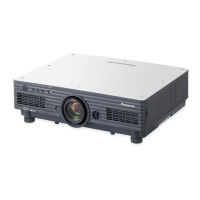
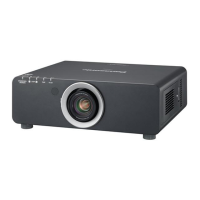
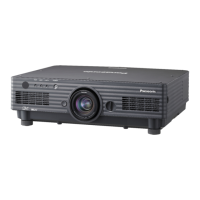

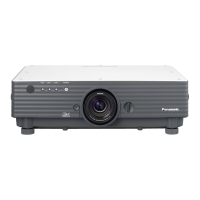
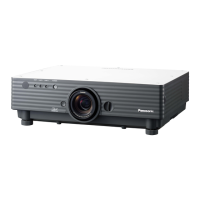
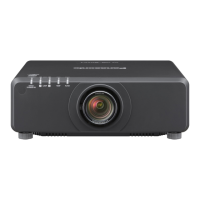
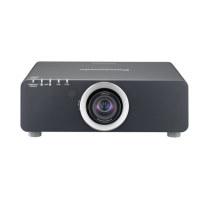
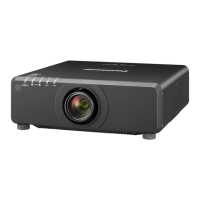
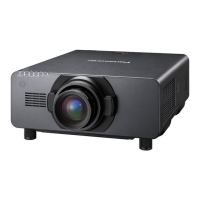
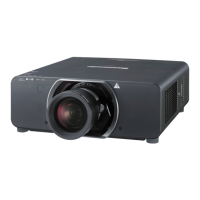
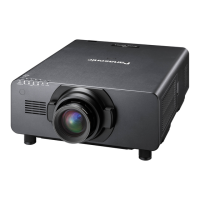
